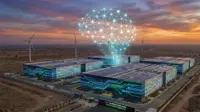AT&T aims to be first with 5G deployment
06 Jan 2018
AT&T Inc is pushing aggressive plans to become the first US carrier to provide fifth-generation, or 5G, mobile service to phone customers this year. It will take on Verizon Communications Inc and T-Mobile US Inc in the race to boost growth or revenue.
It is currently conducting trials of 5G the technology beaming signals between stationary antennas. AT&T said in a statement that it will introduce mobile services in over a dozen US cities later this year, but did not offer specifics. (See: AT&T to start rolling out 5G services in 12 markets by late 2018)
According to commentators, the faster connections will help carriers sell advanced services like virtual reality and 4K video, and enable self-driving cars. Verizon, T-Mobile and Sprint Corp have plans to offer mobile 5G services but have not spelt out their plans, though Verizon expects to introduce fixed service this year as it looks to replace cable and phone modems.
While a slowing industry can use 5G technology to spur growth there are challenges that will need to be addressed. According to estimates mobile-phone companies, chipmakers, device manufacturers and software developers will need to spend around $200 billion a year in research and capital expenses. Further, engineers will need to find ways to get the technology to work around interference from trees and rain and provide a strong enough signal to handle the anticipated demand.
The next-generation 5G wireless technology will eventually replace 4G, operating on a wide range of wireless spectrum, including 600MHz and 700MHz bands. It will theoretically be faster than currently available cellular technology, and will provide better coverage and penetration. It will also be better suited to congested areas such as densely populated cities.
''5G will change the way we live, work and enjoy entertainment,'' said AT&T's technology boss Melissa Arnoldi. ''We're moving quickly to begin deploying mobile 5G this year and start unlocking the future of connectivity for consumers and businesses. With faster speeds and ultra-low latency, 5G will ultimately deliver and enhance experiences like virtual reality, future driverless cars, immersive 4K video and more.''


















